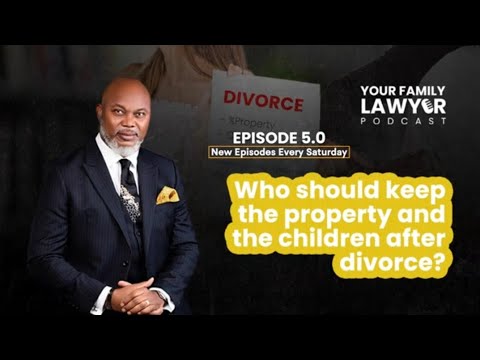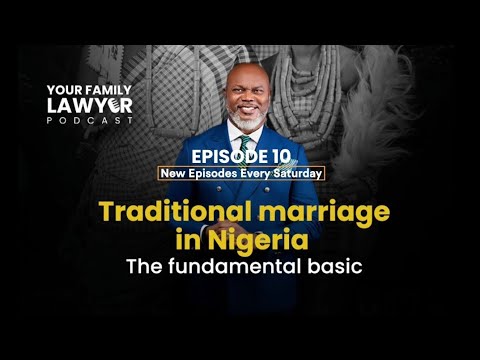Legal Implications of Marriage under the Marriage Act – Part 2
“Welcome back to Your Family Lawyer, the show that provides clarity to the legal side of family life. Today’s episode explores the legal implications of separation and divorce under the Marriage Act. We’ll be talking about rights to maintenance, the division of property, and child custody arrangements when things go south.
We’ll walk through a case that shows how property and child custody are decided during a divorce in Nigeria and wrap up with the financial impact of divorce on both parties.”
Segment 1: Separation and Divorce Under the Marriage Act
Divorce proceedings for marriages under the Marriage Act are governed by the Matrimonial Causes Act, which gives us the guidebook for ending a marriage.
To get a divorce, you’ve got to prove that the marriage has ‘irretrievably broken down’. Section 15 of the Matrimonial Causes Act lays out the grounds for this, including:
- Adultery by the other party.
- Unreasonable behaviour making it intolerable to stay together.
- Desertion for at least one year.
- Living apart for at least two years, with both agreeing to the divorce.
- Living apart for at least three years, even if one doesn’t agree.
These are just some of the reasons the court might grant a divorce. Remember, separation means living apart but still being legally married until the court says otherwise.”
“Separation isn’t divorce. You’re still married and can’t remarry until the divorce is official. But once you’re divorced, the court gets involved with maintenance, property division, and child custody.”
Segment 2: Right to Maintenance Upon Divorce
“Let’s talk about maintenance which is the financial support one spouse may need to give the other after a divorce. Section 70 of the Matrimonial Causes Act empowers the court to decide on maintenance as to whether it’s fair and necessary.
Either spouse can get maintenance, depending on their financial situation. The goal? Make sure a spouse who was financially dependent can still live reasonably post-divorce.
But it’s not a given. The court looks at:
- The income and financial resources of both parties.
- The needs and responsibilities of each spouse.
- The standard of living during the marriage.”
“For example, if one spouse was a stay-at-home parent, they might get maintenance to keep living comfortably. Maintenance payments get reviewed and can change if circumstances do.”
Segment 3: Division of Property Upon Divorce
“Next, we have the division of property. In Nigeria, there’s no automatic 50-50 split of property. The court decides based on what’s ‘just and equitable.’
Section 72 of the Matrimonial Causes Act gives the court the power to split property, considering:
- Financial contributions of each spouse.
- Non-financial contributions like home care and child-rearing.
- The welfare of the children.
- Future financial needs and earning potential of each spouse.”
“This means property division isn’t just about who paid for what. The court looks at all contributions, financial or otherwise, to decide what’s fair. For instance, a spouse who stays home to raise kids might get a big share of the marital home.
Segment 4: Child Custody Arrangements
“Child custody arrangement is another crucial aspect of divorce. The Matrimonial Causes Act and the Child’s Rights Act focus on the best interests of the child. Courts consider factors like:
- The emotional and physical needs of the child.
- The stability of the home environment.
- The child’s age and relationship with each parent.
- Any history of family violence or neglect.
For younger children, especially infants and female children, courts often prefer that they stay with the mother unless there’s a compelling reason to decide otherwise.
Joint custody is often encouraged to ensure that both parents remain involved in the child’s life, except where such will endanger the child.”
Segment 5: Case Study – Division of Property and Child Custody in a Divorce Case
“Let’s look at the case of Oyeniran v. Oyeniran. The couple had various properties and couldn’t agree on how to split them after separating. They also had to decide on the custody of their three children: Moses (15), Adele (11), and Princess (3).
The Court ultimately decided it had the power to order the sale of property and divide the proceeds to ensure fairness. They looked at factors like income, financial needs, and contributions to the family, both financial and nonfinancial. Additionally, the court addressed child custody, ensuring the children’s best interests were prioritised.”
Screenplay
INT. FAMILY HOME – LIVING ROOM – DAY
MR. OYENIRAN and MRS. OYENIRAN sit on opposite ends of the couch, both looking frustrated. The room is filled with an air of tension as they discuss their separation.
MR. OYENIRAN
(Sighs)
So, what are we going to do about the houses and the cars?
MRS. OYENIRAN
(Defensive)
I put just as much work into this family as you did! I deserve my share.
MR. OYENIRAN
(Firmly)
I’m not saying you don’t, but we need to figure out a fair way to divide everything.
INT. COURTROOM – DAY
The JUDGE, an elderly woman with glasses, sits at the bench. MR. OYENIRAN and MRS. OYENIRAN stand at their respective tables, looking anxious.
JUDGE
After reviewing the case, this court has the authority to order the sale of your property and divide the proceeds to ensure a fair settlement.
INT. COURTROOM – DAY (LATER)
The JUDGE addresses the court, looking at both parties.
JUDGE
When dividing matrimonial property, the court considers several factors, including the income and earning capacity of each party, their financial needs and obligations, the standard of living enjoyed by the family before the breakdown of the marriage, the age and duration of the marriage, any physical or mental disability, and the contributions each party made to the family.
INT. FAMILY HOME – FLASHBACK
Images of MR. OYENIRAN and MRS. OYENIRAN raising their children, Moses (15), Adele (11), and Princess (3), sharing household chores, and working on family projects together. Both are shown contributing in various ways.
INT. COURTROOM – DAY (PRESENT)
The JUDGE continues her verdict.
JUDGE
This court emphasises the need for a just and equitable distribution of properties. We consider both financial and non-financial contributions made by each party.
The courtroom is quiet as everyone listens intently.
JUDGE
Therefore, I order that the property be sold and the proceeds divided equally between Mr. and Mrs. Oyeniran.
INT. COURTROOM – DAY (CONTINUOUS)
The JUDGE turns her attention to the custody arrangements.
JUDGE
Regarding the custody of Moses (15), Adele (11), and Princess (3), the court must consider the best interests of the children. The Matrimonial Causes Act and the Child’s Rights Act emphasize that the welfare of the children is paramount.
JUDGE
Given the ages of the children, Moses (15) is old enough to express his preference. Adele (11) and Princess (3) are of tender age, and their emotional needs must be carefully considered.
JUDGE
Therefore, I award joint custody to Mr. and Mrs. Oyeniran. Adele (11) and Princess (3) will primarily reside with Mrs. Oyeniran, considering their age and need for stability. Moses (15) will have the option to choose his primary residence, with visitation rights for the non-custodial parent.
EXT. COURTHOUSE – DAY
MR. OYENIRAN and MRS. OYENIRAN stand outside the courthouse, looking relieved but contemplative.
Narrator
“As can be seen here, the case of Oyeniran v. Oyeniran established the principle that courts have the power to order the sale of matrimonial property and divide the proceeds to ensure fairness. It highlighted the importance of considering both financial and non-financial contributions in the pursuit of equity. The court also emphasised the best interests of the children in custody arrangements, ensuring their welfare and stability.”
INT.FAMILY HOME – LIVING ROOM – DAY (AFTER COURT DECISION) MR. OYENIRAN and MRS. OYENIRAN sit with their children, reassuring them that they will always be there for them, no matter what.
MR. OYENIRAN
(Softly)
We may not be together anymore, but we both love you very much and we’ll always be a family.
MRS. OYENIRAN
(Teary-eyed)
We’ll work together to make sure you’re happy and safe.
The children nod, relieved, as they hug both parents.
Segment 6: Legal Implications – Financial Impact of Divorce on Both Parties
Narrator:
“Divorce hits hard financially. One spouse might end up financially secure with maintenance or a larger share of the property, while the other might face financial strain, especially if they have to support a former spouse and themselves.
The court tries to balance things, ensuring neither party is left struggling. But divorce often means a dent to both parties’ living standards.
Get legal advice when dealing with any stage of divorce. Knowing your rights and obligations helps manage the financial fallout.”
“In summary, separation and divorce under the Marriage Act come with big legal and financial consequences. From maintenance payments to dividing property and arranging child custody, the court aims to be fair to both parties while prioritising the best interests of the children.
If you’re going through a divorce or separation, know your legal rights, especially regarding property, financial support, and child custody. Always consult a lawyer to protect your interests.
I believe that you learnt something from today’s episode of Your Family Lawyer. Join us next time as we continue to explore the complexities of marriage. Until then, stay informed and be empowered. And please be good to your family!” My name is Chuma Chinye, and I am Your Family Lawyer.







